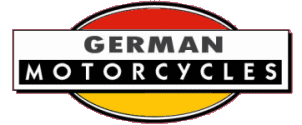

Manufactured by Fahrradhaus Frischauf, Offenbach, 1928-1934
The first motorcycle was built in 1928, the 500cc Type 29 T with a Küchen engine.
Their first models were powered by 198cc JAP engines, which exempted them from tax and allowed their owners to drive without a license. The market for these was intensely competitive, and it was a real struggle when faced with the sales networks of the well-established brands.
The firm had a close relationship with a workers co-operative which produced bicycles, dating back to 1896.
In the 1880s cycling clubs sprang up all over Germany with social democratic support, nicknamed "Solidarity" to distinguish themselves as a working class - previously the cost of owning such machines had been prohibitive to all but the upper echelons. In 1896 the "Solidarity" central association was founded with its base in Chemnitz, and in 1907 it was relocated to Offenbach am Main.
The association, renamed "Arbeiter Rad- und Kraftfahrerbund Solidarität", had become the largest cycling association in the world.
In 1922 the production of its own bicycles began in Offenbach. The workforce grew steadily and the product range was further expanded. In addition to women's and men's bicycles, bicycle accessories were also produced in-house. Most of the Frischauf cycles were painted green, a trademark of the company. Sewing machines and motorcycles soon joined the catalogue. The company operated very successfully in times of high unemployment in Germany, and it delivered social benefits such as housing for employees and insurance policies for cooperative members.
JAP and Blackburne engines of 198cc were employed in their first motorcycles, destined for the tax-free market segment, which proved very competitive. A change of tack saw the introduction of a sports model in 1929 when they introduced a 500cc four-stroke with a 3-valve OHC Kürchen engine - a true sports machine.
Motorcycles in the catalogue for 1933 included lightweights with Sachs engines (Herren and Damen), a 200cc two-stroke model Z.8, a 200cc model V.8 four-stroke and a 500cc four-stroke Kürchen.
After the National Socialists seized power in early 1933, the success story ended under violent circumstances. The Nazis prohibited the cycling association and stole the cooperative property. The chairman, Heinrich Niemann, was murdered in his office by members of the SA, the company premises were occupied and employees who were unwilling to bow down were deported to concentration camps.
The former cooperative company was initially taken over by Mayweg-Werke and then in 1938 was renamed REX-Maschinenbaugesellschaft mbH. During the war, Rex employed around 600 prisoners of war and forced laborers for armaments production. The allies bombed the factory, causing production to cease. After the war, little compensation was given to the re-established "Solidarity", and within a few short years it was all over.
Sources:
1. motosdoseculoxx.blogspot.com
2. frischauf-frankfurt.jimdo.com Licence: CC BY-SA 3.0
If you have a query or information about these German motorcycles please contact us